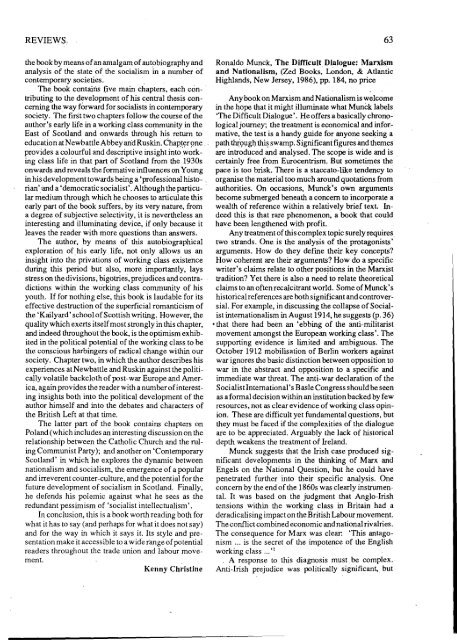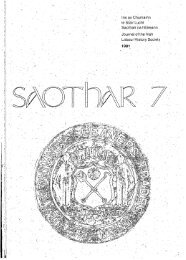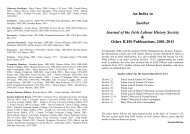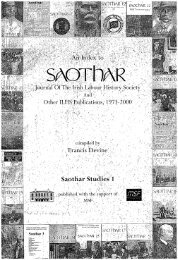62that available to the Scottish Lowland urban workerwho was completely dependent on industrial developmentThe other essays in the fIrs t section deal with issueswhich, on the face of it, may seem arcane to thoseinterested in popular history. But this is not always so.A discussion of land and lordship in sixteenth andseventeenth century Ireland, for instance, reminds us ofthe reification of rights, the disruption of traditionalsocial connections and the growth of dependency onthe colonial power. Lordship, while a feudal concept,did have some sense oflegitimacy, particularly in celticculture and society: strenuous but not always successfulefforts were made to break the dependency of thelordship on the people and replace it with a dependencyon the government. Equally, West Highland chiefsengaged, over two centuries, in what might be describedas proto-capitalist concentration of wealth andthe means of exchange which laid the foundations forthe development in the eighteenth century of absenteeism,money rents, reification of rights and, eventually,the eviction of the 'clanspeople'. A study of landedsociety during the inter-regnum in both Scotland andIreland reveals that this period of standardisation andcentralised government did not lead to uniformity inboth countries: the crucial difference being Ireland'sstatus as a colony.The middle section of the essays throws up anumber of very interesting contributions. Connollyproposes a reassessment of the policing aspects of thetraditional 'unruly Ireland/quiescent Scotland' view bysuggesting that the harsh measures deemed necessaryagainst some popular disturbances in eighteenth centuryScotland and the systematic extension of militarycontrol over the Highlands saw no Irish equivalent untilthe end of the century. Things did, of course, changethen. Devine also contrasts the relative levels of unrestand stability in rural Ireland and Scotland in the period1760-1840. He contrasts the more or less acquiescentacceptance of change in rural Lowland Scotland withthe sporadic resistance in Ireland in the same period.Equally, while Highland resistance was a last-ditch andpoorly organised reaction to the threat of eviction, Irishdefence of the peasant code was more organised, withmilitary overtones.Aspects of the more modem period are addressed inthe third section. A contribution on the linen industriesof Scotland and Ireland compares its continuing preeminencein Ireland in the mid-nineteenth century withits less prominent role in Scotland and underlines thefact that the Scottish, or Angus, coarse linen comple~mented rather than competed with the Irish fIne linen.Two essays illuminate the darker recesses of banking.The fIrst, on bank lending in post-famine Ireland,argues that the banks' role was more positive andcomplex than had previously been suggested while theother proposes a positive reassessment of the role of theSAOTHAR 13banks in the development of Scottish industry. Thediffering signifIcance and importance of sewing outworkingamong women in the social and. economicdevelopment of Scotland and Ulster is teased out byBrenda Collins in an essay on the 'flowerers' of bothcountries. In Ulster, sewing seems to have underpinnedand encouraged the spread of business enterprise to aless industrialised area while in Scotland no such connectionexisted, runildevelopment concentrated on theagriCUltural and young people emigrated to the cities,especially Glasgow. The physical interface betweenScotland and Ireland is, of course, the sea and it isperhaps not surprising, as Vivien Pollock shows, thatconnections between the Down fIshing industry and itsScottish counterpart were strong. The place of theDown industry in the wider industry perhaps explainswhy fresh fish from local sources are much less predominantthan, say, on the Angus coast. GrahamWalker contrasts the way in which the labour movementin Scotland overcame much of its early sectarianproblems, largely because of its dilution in broader UKissues, to become an integral part of the British labourmovement in the inter-war period. In Northern Irelandno such victory, he argues, was possible: it was notbuilt into the British labour movement, it operated in aUnionist statelet where the national question remainedparamount and the labour movement could not effectivelyrise above sectarianism to embrace class politics.Overall, this is a useful comparative study of theeconomy and society of Scotland and Ireland over theperiod 1500-1939, and itis one which many interestedin labour history will enjoy dipping into. There are afew valuable nuggets in this volume and a few reassessmentsmay also be lurking there.Ken LogueJames D. Young, Making Trouble. AutobiographicalExplorations and Socialism, (Clydeside Press,Glasgow, 1987), pp. 129, £4.20 paperbackMaking Trouble is a short, highly readable, andprovocative book. The author, a Scottish socialist andlabour historian, presents his case for a more optimistic'democratic socialism' based on a tradition of socialism-from-belowwhich he traces through Maclean, deLeon and Debs. This Promethean tradition is counterposedto the Leninist tradition to which he attributesmuch of the 'serious crisis of late twentieth centurysocialism' and accuses of 'hiding behind a cynical,tired and timeless, urihistoric and abstract internationalismunrelated to real communities or real people'.While such arguments are clearly contentious andhighly debatable, the power of this book lies, to a largeextent, in the conviction of the author in his presentationof his argument. Young develops his polemic in
REVIEWS,63the book by means of an amalgam of autobiography andanalysis of the state of the socialism in a number ofcontemporary societies: .The book contains five main chapters, each cOntributingto the development of his central thesis concerningthe way forward for socialists in contemporarysociety. The firSt two chapters follow the course of theauthor's early life in a working.class community in theEast of Scotland and onwards through his return toeducation at N ewbattle Abbey and Ruskin. Chapter ~meprovides a colourful and descriptive insight into 'workingclass life in that part of Scotland from the 1930sonwards and reveals the formative influences on Youngin his development towards being a 'professional histo- .rian',and a 'democratic socialist' . Although the particularmedium through which he chooses to articulate thisearly part of the book suffers, by its very nature, froma degree of subjective selectivity, it is nevertheless aninteresting and illuminating device, if only because itleaves the reader with more questions than answers.The author, by means of this autobiographicalexploration of his early life, not only allows us aninsight into the privations of working class existenceduring this period but also, more importantly, laysstress on the divisions, bigotries, prejudices and contradictionswithin the working class community of hisyouth. If for nothing else, this book is laudable for itseffective destruction of the superficial romanticism ofthe 'Kailyard' school of Scottish writing. However, thequality which exerts itself most strongly in this chapter,and indeed throughout the book, is the optimism exhibitedin the political potential of the working class to bethe conscious harbingers of radical change within oursociety. Chapter two, in which the author describes hisexperiences at Newbattle and Ruskin against the politicallyvolatile backcloth of post-war Europe and America,again provides the reader with a number of interestinginsights both into the political development of theauthor himself and into the debates and characters ofthe British Left at that time.The latter part of the book contains chapters onPoland (which includes an interesting discussion on therelationship between the Catholic Church and the rulingCommunist Party); and another on 'ContemporaryScotland' in which he explores the dynamic betweennationalism and socialism, the emergence of a popularand irreverent counter-culture, and the potential for thefuture development of socialism in Scotland. Finally,he defends his polemic against what he secs as theredundant pessimism of 'socialist intellectualism'.In conclusion, this is a book worth reading both forwhat it has to say (and perhaps for what it does not say)and for the way in which it says it. Its style and presentationmake it accessible to a wide r'ange of potentialreaders throughout the trade union and labour movement.Kenny ChrlstlneRonaldo Munck, The Difficult Dialogue: Marxismand Nationalism, (Zed Books, LOndon, & AtlanticHighlands, New Jersey, 1986), pp. 184, no priceAny book on Marxism and Nationalism is welcomein the hope thatit might illuminate what Munck labels'The Difficult Dialogue'. He offers a basically chronologicaljourney; the treatment is economical and inforcmative, the test is a handy guide for anyone seeking apath tln:"9ugh thi§ swamp. Significant figures and themesare introduced and analysed. The scope is wide and iscertainly free from Eurocentrism. But sometimes thepace is too brisk. There is a staccato-like tendency toorganise the material too much around quotations fromauthorities. On occasions, Munck's own argumentsbecome submerged beneath a concern to incorporate awealth of reference within a relatively brief text Indeedthis is that rare phenomenon, a book that couldhave been lengthened with profit.Any treatment of this complex topic surely requirestwo strands. One is the analysis of the protagonists'arguments. How do they define their key concepts?How coherent are their arguments? How do a specificwriter's claims relate to other positions in the Marxisttradition? Yet there is also a need to relate theoreticalclaims to an often recalcitrant world. Some ofMunck' shistorical references are both significant andcontroversial.For example, in discussing the collapse of Socialistinternationalism in August 1914, he suggests (p. 36)• that there had been an 'ebbing of the anti-militaristmovement amongst the European working class'. Thesupporting evidence is limited and ambiguous. TheOctober 1912 mobilisation of Berlin workers againstwar ignores the basic distinction between opposition towar in the abstract and opposition to a specific andimmediate war threat. The anti-war declaration of theSocialist International 's Basle Congress should be seenas a formal decision within an institution backed by fewresources, not as clear evidence of working class opinion.These are difficult yet fundamental questions, butthey must be faced if the complexities of the dialogueare to be appreciated. Arguably the lack of historicaldepth weakens the treatment of Ireland.Munck suggests that the Irish case produced significantdevelopments in the thinking of Marx andEngels on the National Question, but he could havepenetrated further into their specific analysis. Oneconcern by the end of the 1860s was clearly instrumental.It was based on the judgment that Anglo-Irishtensions within the working class in Britain had. aderadicalising impact on the British Labour movement.The conflict combined economic and national rivalries.The consequence for Marx was clear: 'This antagonism... is the secret of the impotence of the Englishworking class ... q. A response to this diagnosis must be complex.Anti-Irish prejudice was politically significant, but
- Page 1 and 2:
JOURNAL OF THE IRISH LABOUR HISTORY
- Page 3 and 4:
ContentsPageEditorial: Labour Histo
- Page 5 and 6:
EDITORIAL 3freedom to participate i
- Page 7 and 8:
CorrespondenceThe Irish Labour Part
- Page 9 and 10:
; ~ ; ,The Decline and Fall of Donn
- Page 11 and 12:
THE DECLINE AND FALL OF DONNYBROOK
- Page 13 and 14: THE DECLINE AND FALL OF DONNYBROOK
- Page 15 and 16: ·' THE DECLINE AND FALL OF DONNYBR
- Page 17 and 18: THE DECLINE AND FALL OF DONNYBROOK
- Page 19 and 20: THE DECLINE AND FALL OF DONNYBROOK
- Page 21 and 22: THE DECLINE AND FALL OF DONNYBROOK
- Page 23 and 24: THE DECLINE AND FALL OF DONNYBROOK
- Page 25 and 26: ,'-,;-''''.A PASSAGE TO BRITAIN 23C
- Page 27 and 28: A PASSAGE TO BRITAIN 25only in the
- Page 29 and 30: A PASSAGE TO BRITAIN 27clothing._De
- Page 31 and 32: A PASSAGE TO BRITAIN 29established
- Page 33 and 34: ;:-.",.- .. .", ...... '.:. '
- Page 35 and 36: LOUIE BENNETI 33feminist movement w
- Page 37 and 38: :... ~: ."
- Page 39 and 40: -.- '.LOUlE BENNETT 37While there i
- Page 41 and 42: LOUIE ~ENNEIT 39Xl's encyclical Qua
- Page 43 and 44: LOUIE BENNEIT 41Bennett's own relat
- Page 45 and 46: LODIE BENNETT 43109; IWWU resolutio
- Page 47 and 48: Essays in ReviewCosherers, Wanderer
- Page 49 and 50: ••• .".'. >. '~"ESSA YS IN RE
- Page 51 and 52: ESSAYS IN REVIEW 49ConnolIy:Myth an
- Page 53 and 54: ESSAYS IN ~EVIEW 51tion' in the Int
- Page 55 and 56: ESSAYS IN REVIEW53International:'I
- Page 57 and 58: REVIEWScontroversy is real history.
- Page 59 and 60: REVIEWSJoe Monks was among the earl
- Page 61 and 62: REVIEWSnolly-Column Song','Proudly
- Page 63: REVIEWSresulting from the arrival o
- Page 67 and 68: REVIEWSlogue, it is hardly surprisi
- Page 69 and 70: The Team For All Workers ...CULIAIB
- Page 71 and 72: ESSAYS 69mission and moral refonn.l
- Page 73 and 74: .. ...... ~.~ -~ .'- '.ESSAYS. 71fr
- Page 75 and 76: ESSAYS 73claimed authority but whic
- Page 77 and 78: ESSAYS 75provided the basis for soc
- Page 79 and 80: ESSAYS 779. For comparisons see E.T
- Page 81 and 82: ESSAYS 7952. Annals of Christ Churc
- Page 83 and 84: ESSAYS' 81Fianna Fail and the Worki
- Page 85 and 86: ESSAYS 83Eireann in 1925 visibly di
- Page 87 and 88: ESSAYS 85recognition of the impract
- Page 89 and 90: ESSAYS 871970, it created the condi
- Page 91 and 92: ESSAYS89The Irish Immigrants' Contr
- Page 93 and 94: ESSAYS" 91Although anti -Catholic p
- Page 95 and 96: ESSAYS 93McCowie played a key role
- Page 97 and 98: :. -,,'.' ',. .~.,:.ESSAYS 95Althou
- Page 99 and 100: ESSAYS 97young girl of their own ba
- Page 101 and 102: SourcesIrish Labour History Society
- Page 103 and 104: SOURCES 101INovember, 1971 to no. 1
- Page 105 and 106: SOURCES 103would claim credit for t
- Page 107 and 108: SOURCES105Sources for Irish Labour
- Page 109 and 110: SOURCES 107NorthWest Archives and L
- Page 111 and 112: SOURCES 109In 1966 the Finnish gove
- Page 113 and 114: TURNINGANEWLEAFThe CPSSUis the larg
- Page 115 and 116:
REMINISCENCE 113us due to my politi
- Page 117 and 118:
REMINISCENCE 115when Jim was presen
- Page 119 and 120:
REMINISCENCE 117of Dail Eireann. 17
- Page 121 and 122:
REMINISCENCE 119NotesThe above arti
- Page 123 and 124:
DOCUMENT STUDY 121James Connolly in
- Page 125 and 126:
DOCUMENT STUDY123SOCIAL DEMOCRATIC
- Page 127 and 128:
DOCUMENT STUDY 125proletariat of th
- Page 129 and 130:
DOCUMENT STUDY 127the support of Je
- Page 131 and 132:
DOCUMENT STUDY 12926. The Workers'
- Page 133 and 134:
131BibliographyA Bibliography of Ir
- Page 135 and 136:
BIBLIOGRAPHY 133Compton, P.A. Demog
- Page 137 and 138:
BIBLIOGRAPHY 135Levine, I. and Madd
- Page 139 and 140:
BIBLIOGRAPHY 137Turner, M. 'Towards
- Page 141 and 142:
BIBLIOGRAPHY 1394. Land and Agricul
- Page 143 and 144:
BIBLIOGRAPHY 141Clogher Record12 (2
- Page 145 and 146:
BIBLIOGRAPHY 143Political Research
- Page 147 and 148:
BIBLIOGRAPHY 145Pres, 1987.O'Brien,
- Page 149 and 150:
147Notes on Contributorsf onathanBe
- Page 151 and 152:
1901: Ireland's first general union
- Page 153 and 154:
ELECTRICAL TRADES UNION .Establishe





